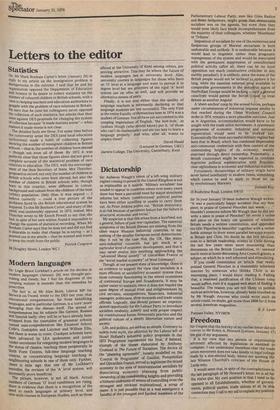Modern languages
Sir: Logie Bruce Lockhart's article on the decline in modern languages (January' 24) was thought-provoking and timely, but I feel his diagnosis of the creeping malaise is sounder than the remedies he prescribes.
The fact is, as Mr Alan Beith, Liberal MP for Berwick-on-Tweed, wrote to the DES last year. that educational reorganisation, far from benefiting languages, and in particular German, is a 'cure' more damaging than the disease itself. The spread of comprehensives has hit subjects like German, Russian and Spanish badly; they will be or have already been scrapped from the timetables of grammar schools turned mini-comprehensives like Emanuel School, Colfe's, Godolphin and Latyrner and William Ellis, and there is worse to come. Crackpot schemes have been advanced by LEA spokesmen and junior .under-secretaries for relegating modern languages to the status of classics, teaching them peripherally in Sixth Form Centres, full-time language teaching centres, or concentrating language teaching in neighbouring schools in one of them only. Further, there is little sign that one of Mr LoCkhart's remedies, the revision of the 'A' level system, will necessarily prove beneficial. The picture, however, is not all black. Actual numbers of German '0' level candidates are rising, there is evidence that there is a recognition of the need to teach languages at primary level, and new-style courses in European Studies, such as those
offered at the University of Kent among others, are proving attractive. This may be where the future of modern languages lies at university level. Also, university courses in languages for those who have an '0' level in a language and want to pursue it to degree level but are prisoners of the rigid 'A' level system are on offer as well, and will provide an alternative means of entry.
Finally, it is not true either that the quality of language teachers is necessarily declining or that language students are less successful. The only First in the entire Faculty of Humanities here in 1974 was a student of German. Not all have yet succumbed to the creeping imperialism of English, 'the bolt-hole,' as Graham Hough (who should know) put it, 'of those who can't do mathematics and are too lazy to learn a language properly.' And who, after all, wants to employ them? David Heald (Lecturer in German, UKC) Darwin College, The University, Canterbury, Kent


























 Previous page
Previous page